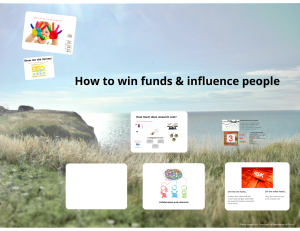Today I delivered a workshop at UWE entitled “How to win funds & influence people“. This is an event aimed squarely at researchers who are wanting to know a bit more about the process of applying for research funding, an introduction if you like as opposed to a masterclass in bidding.
I started the day by asking the participants where they wanted to go with their career – something that one might think is obvious to most – but I’ve found that many researchers have no real understanding of their options and wish to remain in academic research as a default position as recently highlighted in a report from Vitae – “Straight Talking”
The realities of academic research
I pointed to the reality of being an employed researcher on a research-only contract by highlighting some of the criteria required in the role profiles illustrating the point that getting involved in writing bids for research funding at the earliest opportunity is advantageous if not expected. It also served the purpose of making research students aware of the difference between postgraduate research study (oh the halcyon days!) versus some of the harsher realities of working as a paid researcher.
How is research funding distributed in the UK?
I then summarised where money for research comes from, I’ve written about this more extensively here, to try and raise awareness of this. I remember not being remotely aware of the sources for funding as a postgraduate researcher but actually I believe it is more important than ever to get a handle on this. It’s one thing to have an understanding about the funding bodies but it is quite another to really understand the politics involved as well.
Here’s a really useful factsheet that explains how funding for research in the UK works, it’s well worth a read.
Next up came an explanation of costing – now this isn’t something I am a particular expert in – but I offered this fundamental truth to researchers:
There is a difference between how much a research project costs to do and how much the funder will pay (the price)
I know many experienced academics who still don’t understand this, it is fundamental to informing how you would put a bid together in terms of asking for resources. I’d encourage all researchers to start thinking about this and seek out the advice. The Research Whisperer blog is a great place to start.
Here’s the prezi that summarises all that:
Bidding for funding
The second fundamental truth about applying for research funding is around the 3 R’s
Read the guidelines!
Read the guidelines!
Read the guidelines!
All flippancy aside, it’s amazing how many folks ignore what the funders say they will resource in what area and when so ignore at your peril.
Searching for the right funding opportunity
I then gave an overview of a database that UWE subscribes to, Research Professional. We discussed hints & tips on how to get the best of the search function (start broad with topics then narrow in) and how to set up automated alerts to ease the burden.
Making Connections
We finished off the day by focussing on a further fundamental truth about research funding:-
Collaboration is where it’s at
More and more research funding is being awarded to collaborative ventures. This means it is imperative that you build up a reputation as researcher to make it easier to find other researchers to work with.
This brought up the topic of networking. I decided to approach this from a slightly different perspective, rather than advising folks to get out there and press the flesh (which is the standard take on networking) I empathised with the notion of being a shy connector as set out by Sacha Chua.
Her presentation on networking as an introvert speaks volumes…
I also showed the TED talk by Susan Cain about how it’s harder (takes more energy) for introverts to interact in a world geared up for extroverts… (more info on introverts/extroverts)
So there it is, an introduction to research funding in 10 points:-
1) Do you want to be an academic researcher?
2) If so, applying for funding is integral to the job/success
3) Understand the funding landscape
4) Start small and build your track record
5) There is a difference between how much research costs and how much will be paid for (price)
6) The funder determines the price
7) So remember the 3 Rs (Read the guidelines! x 3)
8) Get into the habit of horizon scanning for funding opportunities
9) Find conference funding and put yourself out there
10) You can’t do this alone, collaboration is where it’s at
Questions, thoughts are most welcome. Maybe you have some advice to share with aspiring researchers?
